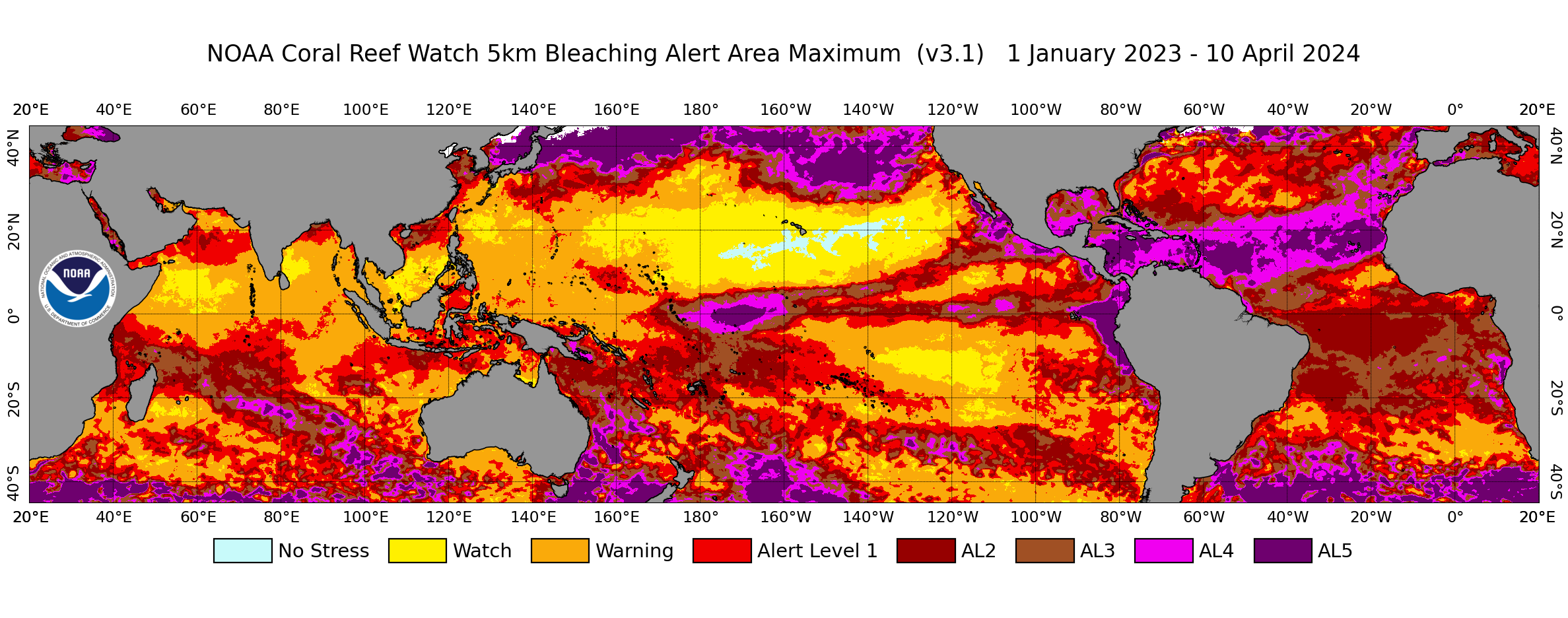The world is currently experiencing a global coral bleaching event, according to NOAA scientists. This is the fourth global event on record and the second in the last 10 years.
Bleaching-level heat stress, as remotely monitored and predicted by NOAA’s Coral Reef Watch (CRW), has been — and continues to be — extensive across the Atlantic, Pacific and Indian Ocean basins. CRW's heat-stress monitoring is based on sea surface temperature data, spanning 1985 to the present, from a blend of NOAA and partner satellites.
NOAA Coral Reef Watch's global 5km-resolution satellite Coral Bleaching Alert Area Maximum map, for January 1, 2023 to April 10, 2024. This figure shows the regions, around the globe, that experienced high levels of marine heat stress (Bleaching Alert Levels 2-5) that can cause reef-wide coral bleaching and mortality. (Image credit: NOAA)"From February 2023 to April 2024, significant coral bleaching has been documented in both the Northern and Southern Hemispheres of each major ocean basin," said Derek Manzello, Ph.D., NOAA CRW coordinator.
Since early 2023, mass bleaching of coral reefs has been confirmed throughout the tropics, including in Florida in the U.S.; the Caribbean; Brazil; the eastern Tropical Pacific (including Mexico, El Salvador, Costa Rica, Panama and Colombia); Australia’s Great Barrier Reef; large areas of the South Pacific (including Fiji, Vanuatu, Tuvalu, Kiribati, the Samoas and French Polynesia); the Red Sea (including the Gulf of Aqaba); the Persian Gulf; and the Gulf of Aden.
NOAA has received confirmation of widespread bleaching across other parts of the Indian Ocean basin as well, including in Tanzania, Kenya, Mauritius, the Seychelles, Tromelin, Mayotte and off the western coast of Indonesia.
“As the world’s oceans continue to warm, coral bleaching is becoming more frequent and severe,” Manzello said. “When these events are sufficiently severe or prolonged, they can cause coral mortality, which hurts the people who depend on the coral reefs for their livelihoods.”
Coral bleaching, especially on a widespread scale, impacts economies, livelihoods, food security and more, but it does not necessarily mean corals will die. If the stress driving the bleaching diminishes, corals can recover and reefs can continue to provide the ecosystem services we all rely on.
“Climate model predictions for coral reefs have been suggesting for years that bleaching impacts would increase in frequency and magnitude as the ocean warms,” said Jennifer Koss, director of NOAA’s Coral Reef Conservation Program (CRCP).
https://www.noaa.gov/news-release/noaa-confirms-4th-global-coral-bleaching-event
oceanic currents have become increasingly warmer and we are now seeing tropical temperature water moving north and south along continental shores.
this will result in dramatic shifts in the living conditions of fish populations. many fish live in cooler waters and these are moving away from previous habitats along with the preferred water temperature. this in turn will disrupt fishing industries across the Planet and cause shortages of traditional food supplies in places like Eastern Africa and Sth American states.
note particularly the Atlantic Ocean and Indian Ocean in the image above and be aware that the increasing ocean temperature is disrupting the normal patterns. fish can swim away with their usual cooler currents but corals can't.
this is why corals are the canary in the coal mine that warn us of the changes in the marine environment that global warming is changing how people can live sustainably.
- Forums
- Political Debate
- Coral Bleaching.
The world is currently experiencing a global coral bleaching...
- There are more pages in this discussion • 222 more messages in this thread...
You’re viewing a single post only. To view the entire thread just sign in or Join Now (FREE)
Featured News
Featured News
The Watchlist
BPH
BPH ENERGY LTD
David Breeze, MD & Executive Chairman
David Breeze
MD & Executive Chairman
SPONSORED BY The Market Online





